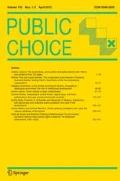Abstract
Saari and Van Newenhizen (1987) misinterpret their findings about the indeterminacy of voting systems: far from being a vice, indeterminacy is a virtue in allowing voters to be more responsive to, and robbing them of the incentive to misrepresent, their preferences. The responsiveness of approval voting, in particular, means that the cardinal utilities that voters have for candidates can be reflected in voters' strategy choices, which ultimately translate into better social choices. Empirical data from a recent election support these claims, showing, among other things, that the Borda system, a determinate voting system favored by Saari and Van Newenhizen, is highly vulnerable to manipulation by strategic voters.
Similar content being viewed by others
References
Brams, S.J., and Fishburn, P.C. (1983). Approval voting. Boston: Birkhäuser.
Brams, S.J., and Fishburn, P.C. (1985). Comment on ‘The problem of strategic voting under approval voting.’ American Political Science Review 79(3): 816–818.
Felsenthal, D.S., Maoz, Z., and Rapoport, A. (1986). Comparing voting systems in genuine elections: Approval-plurality versus selection-plurality. Social Behaviour 1(1): 41–53.
Fishburn, P.C. (1981). Inverted orders for monotone scoring rules. Discrete Applied Mathematics 3(1): 27–36.
Fishburn, P.C., and Gehrlein, W.V. (1976). Borda's rule, positional voting, and Condorcet's simple majority principle. Public Choice 28: 79–88.
Fishburn, P.C., and Little, J.D.C. (1987). An experiment in approval voting. Preprint, AT&T Bell Laboratories, Murray Hill, NJ.
Gehrlein, W.V., Gopinath, B., Lagarias, J.C., and Fishburn, P.C. (1982). Optimal pairs of score vectors for positional scoring rules. Applied Mathematics and Optimization 8(4): 309–324.
Gibbard, A. (1973). Manipulation of voting schemes: A general result. Econometrica 41(3): 587–601.
Gillman, L. (1987). Approval voting and the coming MAA elections. Focus: The newsletter of the Mathematical Association of America 7(2): 2, 5.
Merrill, S., III (1988). Making multicandidate elections more democratic. Princeton, NJ: Princeton University Press (forthcoming).
Moulin, H. (1983). The strategy of social choice. Amsterdam: North Holland.
Niemi, R.S. (1984). The problem of strategic behavior under approval voting. American Political Science Review 78(4): 952–958.
Niemi, R.S. (1985). Reply to Brams and Fishburn. American Political Science Review 79(3): 818–819.
Nitzan, S. (1985). The vulnerability of point-voting schemes to preference variation and strategic manipulation. Public Choice 47(2): 349–370.
Nitzan, S., Paroush, J., and Lampert, S.I. (1980). Preference expression and misrepresentation in points voting schemes. Public Choice 35(4): 421–431.
Rapoport, A., Felsenthal, D., and Maoz, Z. (1987). Proportional representation: An empirical evaluation of single-stage, non-ranked voting procedures. Public Choice 59: 151–165.
Riker, W.H. (1982). Liberalism against populism: A confrontation between the theory of democracy and the theory of social choice. New York: Freeman.
Saari, D.G., and Van Newenhizen, J. (1987). The problem of indeterminacy in approval, multiple, and truncated voting systems. Public Choice 59: 101–120.
Satterthwaite, M.A. (1975). Strategy proofness and Arrow's conditions: Existence and correspondence theorems for voting procedures and social welfare functions. Journal of Economic Theory 10(2): 197–218.
Straffin, P.D., Jr. (1980). Topics in the theory of voting. Boston: Birkhäuser.
Author information
Authors and Affiliations
Additional information
We are grateful to Peter H. Aranson for valuable comments on both substance and style.
Rights and permissions
About this article
Cite this article
Brams, S.J., Fishburn, P.C. & Merrill, S. The responsiveness of approval voting: Comments on Saari and Van Newenhizen. Public Choice 59, 121–131 (1988). https://doi.org/10.1007/BF00054448
Issue Date:
DOI: https://doi.org/10.1007/BF00054448


